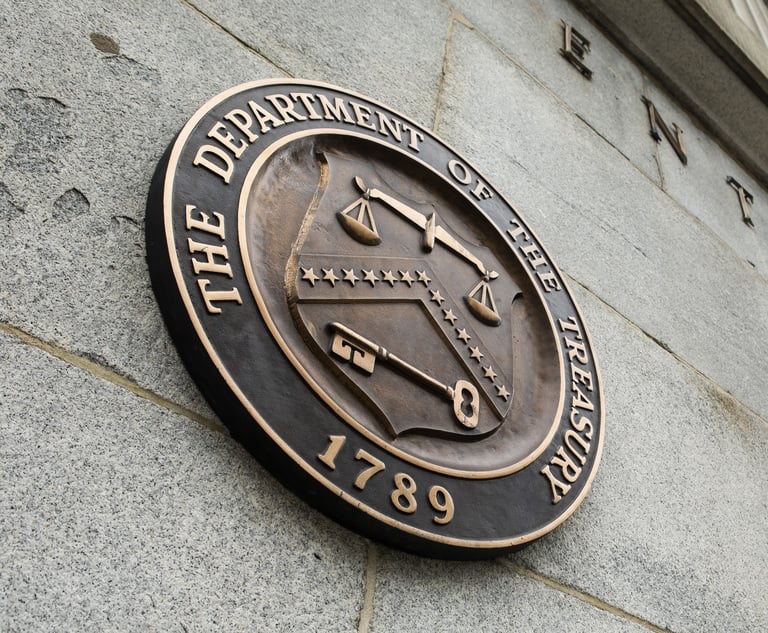High Court Takes Up Cases Involving Discrimination 'Because of Sex' Under Title VII
Some federal appellate courts have recently reached opposite conclusions about whether the prohibition on discrimination in employment "because of … sex" under Title VII of the Civil Rights Act of 1964 includes discrimination on the basis of sexual orientation and transgender status.
November 06, 2019 at 10:00 AM
5 minute read
 Randall Burks, The Law Offices of Robin Bresky, Boca Raton (Photo: Courtesy Photo)
Randall Burks, The Law Offices of Robin Bresky, Boca Raton (Photo: Courtesy Photo)
Some federal appellate courts have recently reached opposite conclusions about whether the prohibition on discrimination in employment "because of … sex" under Title VII of the Civil Rights Act of 1964 includes discrimination on the basis of sexual orientation and transgender status. The U.S. Supreme Court is currently in the process of deciding which of the readings is correct.
In April 2017, the U.S. Court of Appeals for the Seventh Circuit was the first federal appellate court to hold that discrimination on the basis of sexual orientation is a form of discrimination because of sex in Hively v. Ivy Tech Community College (en banc). In February 2018, the Second Circuit (en banc) followed suit in Zarda v. Altitude Express, holding that "Title VII prohibits discrimination on the basis of sexual orientation as discrimination 'because of … sex.'" The next month, the Sixth Circuit similarly held that "discrimination on the basis of transgender and transitioning status violates Title VII" in Equal Employment Opportunity Commission v. R.G. &. G.R. Harris Funeral Homes, involving a transgender employee named Aimee Stephens.
Taking the opposite reading, in May 2018, the Eleventh Circuit followed its prior holdings that there is no cause of action for sexual orientation discrimination under Title VII in Bostock v. Clayton County Board of Commissioners. The Eleventh Circuit panel noted that it "cannot overrule a prior panel's holding, regardless of whether we think it was wrong, unless an intervening Supreme Court or Eleventh Circuit en banc decision is issued."
The divergent readings of the phrase "because of … sex" in 2017 and 2018 created a split among the federal circuits. One of the functions of the Supreme Court is to resolve such splits as the final arbiter of federal questions of national significance. An average of 7,000 to 8,000 petitions are filed in the Supreme Court each year, many of them arguing the existence of a split that needs to be resolved by the court. Considering that the Supreme Court accepts only about 1% of the petitions filed each year, it seems significant that the court granted certiorari to review the Second, Eleventh and Sixth Circuits' decisions in Zarda, Bostock and Stephens.
In the pending Supreme Court cases of Altitude Express v. Zarda (case 17-1623) and Bostock v. Clayton County, Georgia (case 17-1618), the former employees were homosexual men. Their briefs primarily argue that the plain language of Title VII forbids discrimination on the basis of sexual orientation because it is a form of sex discrimination; that is, discriminating against an individual for being lesbian, gay or bisexual constitutes discrimination "because of … sex." Further, they argue that the protections in Title VII extend beyond the forms of sex discrimination specifically contemplated by Congress in 1964.
By contrast, the employers' briefs in Zarda and Bostock focus on the "original public meaning" of the phrase "because of … sex" as used in Title VII and as understood when it was enacted. The employers say that meaning referred to "sex" as in being a man or a woman, not the man or woman's sexual orientation. Clayton County argues that the Supreme Court has never deviated from that original public meaning when construing Title VII's use of the term "sex." Altitude Express argues that "Zarda's theories for reading sexual orientation into Title VII are unpersuasive." Similarly, the federal government filed an amicus brief arguing that Congress has "ratified the settled understanding" that "sex" does not mean sexual orientation.
In the Supreme Court's pending Harris Funeral Homes case (18-107), the former employee Aimee Stephens' brief asserts that "the meaning of a statute is determined by its text, even if all of its applications were not expressly contemplated at the time of its enactment," and she argues that the funeral home discriminated against her "because of … sex" when it fired her for being a transgender woman. She also asserts that the discrimination was based on her departing from sex-based stereotypes about men and women.
By contrast, the funeral home's brief focuses on the "original public meaning" of Title VII and asserts that it did not contemplate transgender status, and that Stephens has no valid claim for sex stereotyping. The EEOC's brief argues that "discrimination based on transgender status does not inherently entail discrimination because of sex," and "discrimination based on transgender status does not constitute sex stereotyping … but a transgender plaintiff may use sex-stereotyping evidence to prove a sex discrimination claim."
Oral arguments took place on Oct. 8 in Zarda, Bostock, and Stephens. The former employees focused on the meaning of the textual phrase "because of … sex" and described the discrimination they suffered as being based on a failure to conform to expectations and stereotypes for men and women. The employers argued that sexual orientation and transgender status are distinct from "sex" and were not contemplated when Title VII was enacted. The United States argued that Congress is free to prohibit discrimination on those grounds but did not do so in Title VII.
We will be watching with interest for the decisions in Zarda, Bostock and Stephens. The Supreme Court's ruling will likely rest upon which principles and canons of statutory construction are deemed applicable by a majority of the justices. It will be instructive to see how the court selects and applies those principles to resolve these issues of nationwide significance.
Randall Burks is an appellate attorney with The Law Offices of Robin Bresky in Boca Raton. He is admitted to practice in the U.S. Supreme Court and several other federal appellate courts.
This content has been archived. It is available through our partners, LexisNexis® and Bloomberg Law.
To view this content, please continue to their sites.
Not a Lexis Subscriber?
Subscribe Now
Not a Bloomberg Law Subscriber?
Subscribe Now
NOT FOR REPRINT
© 2025 ALM Global, LLC, All Rights Reserved. Request academic re-use from www.copyright.com. All other uses, submit a request to [email protected]. For more information visit Asset & Logo Licensing.
You Might Like
View All

Don’t Forget the Owner’s Manual: A Guide to Proving Liability Through Manufacturers’ Warnings and Instructions
5 minute read

Trending Stories
- 15th Circuit Considers Challenge to Louisiana's Ten Commandments Law
- 2Crocs Accused of Padding Revenue With Channel-Stuffing HEYDUDE Shoes
- 3E-discovery Practitioners Are Racing to Adapt to Social Media’s Evolving Landscape
- 4The Law Firm Disrupted: For Office Policies, Big Law Has Its Ear to the Market, Not to Trump
- 5FTC Finalizes Child Online Privacy Rule Updates, But Ferguson Eyes Further Changes
Who Got The Work
J. Brugh Lower of Gibbons has entered an appearance for industrial equipment supplier Devco Corporation in a pending trademark infringement lawsuit. The suit, accusing the defendant of selling knock-off Graco products, was filed Dec. 18 in New Jersey District Court by Rivkin Radler on behalf of Graco Inc. and Graco Minnesota. The case, assigned to U.S. District Judge Zahid N. Quraishi, is 3:24-cv-11294, Graco Inc. et al v. Devco Corporation.
Who Got The Work
Rebecca Maller-Stein and Kent A. Yalowitz of Arnold & Porter Kaye Scholer have entered their appearances for Hanaco Venture Capital and its executives, Lior Prosor and David Frankel, in a pending securities lawsuit. The action, filed on Dec. 24 in New York Southern District Court by Zell, Aron & Co. on behalf of Goldeneye Advisors, accuses the defendants of negligently and fraudulently managing the plaintiff's $1 million investment. The case, assigned to U.S. District Judge Vernon S. Broderick, is 1:24-cv-09918, Goldeneye Advisors, LLC v. Hanaco Venture Capital, Ltd. et al.
Who Got The Work
Attorneys from A&O Shearman has stepped in as defense counsel for Toronto-Dominion Bank and other defendants in a pending securities class action. The suit, filed Dec. 11 in New York Southern District Court by Bleichmar Fonti & Auld, accuses the defendants of concealing the bank's 'pervasive' deficiencies in regards to its compliance with the Bank Secrecy Act and the quality of its anti-money laundering controls. The case, assigned to U.S. District Judge Arun Subramanian, is 1:24-cv-09445, Gonzalez v. The Toronto-Dominion Bank et al.
Who Got The Work
Crown Castle International, a Pennsylvania company providing shared communications infrastructure, has turned to Luke D. Wolf of Gordon Rees Scully Mansukhani to fend off a pending breach-of-contract lawsuit. The court action, filed Nov. 25 in Michigan Eastern District Court by Hooper Hathaway PC on behalf of The Town Residences LLC, accuses Crown Castle of failing to transfer approximately $30,000 in utility payments from T-Mobile in breach of a roof-top lease and assignment agreement. The case, assigned to U.S. District Judge Susan K. Declercq, is 2:24-cv-13131, The Town Residences LLC v. T-Mobile US, Inc. et al.
Who Got The Work
Wilfred P. Coronato and Daniel M. Schwartz of McCarter & English have stepped in as defense counsel to Electrolux Home Products Inc. in a pending product liability lawsuit. The court action, filed Nov. 26 in New York Eastern District Court by Poulos Lopiccolo PC and Nagel Rice LLP on behalf of David Stern, alleges that the defendant's refrigerators’ drawers and shelving repeatedly break and fall apart within months after purchase. The case, assigned to U.S. District Judge Joan M. Azrack, is 2:24-cv-08204, Stern v. Electrolux Home Products, Inc.
Featured Firms
Law Offices of Gary Martin Hays & Associates, P.C.
(470) 294-1674
Law Offices of Mark E. Salomone
(857) 444-6468
Smith & Hassler
(713) 739-1250






